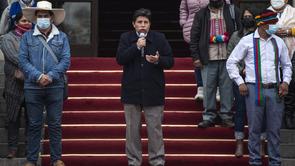 Then Peruvian president Pedro Castillo delivers a speech during a meeting with members of the self-defense committees, the so called "peasant patrols" who act as law-and-order enforcers in parts of rural Peru, at the Government Palace in Lima on Aug 10, 2022. (ERNESTO BENAVIDES / AFP)
Then Peruvian president Pedro Castillo delivers a speech during a meeting with members of the self-defense committees, the so called "peasant patrols" who act as law-and-order enforcers in parts of rural Peru, at the Government Palace in Lima on Aug 10, 2022. (ERNESTO BENAVIDES / AFP)
LIMA - Peru's defense minister announced a nationwide state of emergency on Wednesday, which will take effect in the next few hours and allow soldiers to assist police in maintaining public safety after a week of fiery protests and road blockades.
The protests were sparked by the ousting of former president Pedro Castillo on Dec 7 in an impeachment vote. Castillo, a leftist elected in 2021, was arrested after illegally trying to dissolve the Andean nation's Congress, the latest in a series of political crises the world's second-largest copper producer has faced in recent years.
Prosecutors on Wednesday said they were seeking 18 months of pretrial detention for Castillo, who has been charged with rebellion and conspiracy. Peru's Supreme Court met to consider the request but later suspended the session until Thursday.
Castillo's former vice-president Dina Boluarte was sworn into office after his removal.
The political upheaval has sparked angry and sometimes violent protests around the Andean country, especially in the rural and mining regions that propelled the former peasant farmer and teacher to office in July last year
The political upheaval has sparked angry and sometimes violent protests around the Andean country, especially in the rural and mining regions that propelled the former peasant farmer and teacher to office in July last year.
Six people, mostly teenagers, have died in clashes with the police, authorities have said. All were victims of gunfire, according to rights groups. Protesters have blockaded highways, set fires to buildings, and invaded airports.
"We have agreed to declare a state of emergency throughout the country, due to the acts of vandalism and violence," Boluarte's defense minister Alberto Otárola told reporters.
"This requires a forceful response from the government," he said, adding that it would mean the suspension of certain freedoms, including the right to assembly, the inviolability of the home, and freedom of transit.
READ MORE: Peru's Boluarte names cabinet following Castillo ouster
Elections in 2023?
Boluarte, speaking to reporters from the presidential palace, called for peace and said "we can't have a dialogue if there's violence between us."
She said elections could be moved forward further to December 2023 from April 2024, a date she had pledged earlier. The vote is currently slated for 2026 when Castillo's term would have ended.
Since his arrest Castillo has been detained at the DIROES police facility in Lima. He called on supporters to come to the jail, saying he should be released after the initial seven-day period of pretrial detention expires later on Wednesday.
"I await you all at the DIROES facilities to join you in a hug," Castillo said in a hand-written message posted on Twitter, signing it as the "Constitutional President of Peru." Castillo has denied charges of rebellion and conspiracy.
Castillo also called for the Inter-American Court of Human Rights to intercede on his behalf, as dozens of supporters gathered at the prison demanding he be freed.
However, sources from the prosecutor's office and analysts said Castillo cannot be released while the Supreme Court resolves the prosecutors' request.
ALSO READ: Peru's armed forces to protect key infrastructure amid protests
Peru's judiciary said on Twitter it would hold a hearing by Friday on a "request for pretrial detention for 18 months against former president Pedro Castillo and (former Prime Minister) Anibal Torres, investigated for the crimes of rebellion and others."
Castillo has gained some support from fellow regional leftist leaders, including Mexican President Andres Manuel Lopez Obrador, who criticized his removal as undemocratic.


